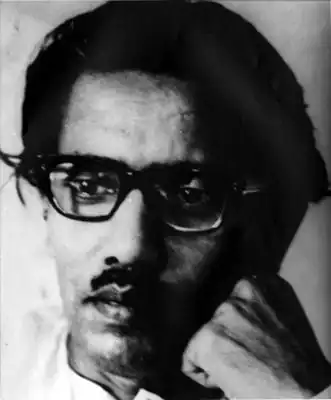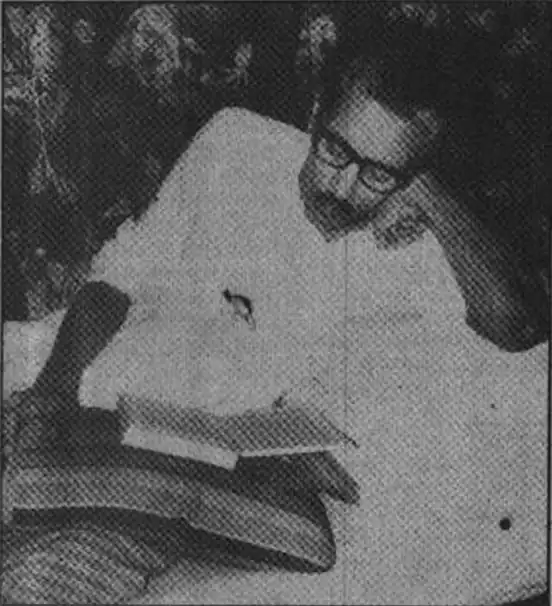Sikander Abu Zafar
Sikander Abu Zafar (19 March 1919 –5 August 1975) was a prominent Bangladeshi journalist and litterateur. He was the founder of the literary magazine Samakal which is considered to be one of the most prominent and progressive Bengali literary publications.
Life
Sikander Abu Zafar was born at Tentulia, Satkhira. His grandfather Syed Alam Shah Hashemi had settled in the area after migrating from Pakistan’s Peshawar. His full name is Syed Al Hashemi Abu Zafar Muhammad Bakht Sikander.

Sikander Abu Zafar passed the Entrance examination (1936) from the Tala B Dey Institute (Satkhira) and passed Intermediate from Ripon College, Kolkata.
Zafar breathed his at the PG Hospital in Dhaka on 5 August 1975. He was only 57. He lies buried at Banani graveyard.
Sikander Abu Zafar’s Career
Sikander Abu Zafar started his career in the military accounts section (1939) in Kolkata. He also worked with Satyendranath Majumdar’s Globe News Agency for some time.
He worked for Dainik Nabajug from 1943 to 1945. Kazi Nazrul Islam was the editor of the daily.
After the Partition, Zafar moved to Dhaka. From the end of 1948 to 1953, he worked as a staff artist in Radio Pakistan.
During this period, he also worked in the Ittefaq ( joined 1953 as associate editor) and the Sangbad. In 1953, he became the editor of the Millat.
In 1957, he founded a monthly magazine called Samakal. Next year, he set up a printing press called Samakal Mudrayan and a publishing house named Samakal Prakashan. Zafar continued to be the editor of Samakal till 1970.
Literary Works and Activism of Sikander Abu Zafar
Sikander Abu Zafar contributed to all most all the branches of literature. His works include eight books of poem, four novels, four dramas and more than 600 songs. He translated several major literary works into Bengali.
He started writing poems in school life. His first book was Mati ar Ashru (1942).
Zafar was one of the leading figures in the cultural movement in East Pakistan during the 50’s and 60’s. He mobilized writers, artists and cultural activists against Ayub Khan’s military regime during the mass uprising in 1969.
He pioneered a literary movement in East Pakistan through his magazine Samakal [Contemporary]. In fact, Samakal was the breeding ground of many famous literary figures of the Benali literature such as Al Mahmud and Abdul Mannan Syed.
He was also the editor of fortnightly literary magazine Samakalin Sahitya [Contemporary Literature].
During the Liberation War, Sikander Abu Zafar left Dhaka for Kolkata in July, 1971 to actively participate in the War. Several of his songs were recorded and broadcast from the Swadhin Bangla Betar Kendra, the radio station run by the Mujibnagar government from Kolkata. His “Amader Sangram Cholbei”[our struggle will continue], in particular, motivated people throughout the war. A weekly magazine named Abhijan was published under his editorship during the War.
After the independence of Bangladesh, in 1973, Sikander Abu Zafar took a strong postion against the government’s attempt to gag two newspapers – Ganakantha and Holiday. He was a leading figure in the Manantar Protirodh Andolon [ Movement Against Famine] during the famine in 1974. He was also the chair of the Nagorik Adhikar Songrokkhon Committee [Citizen’s Rights Protection Committee], which was established in the same to fight against the then government’s repressive measures.

Published works
- Mati ar Ashru [Translation of the title: Soil and tears; Genre: Novel, Language: Bengali; Publication date: 1942; this was his first book]
- Joyer Pothe [ Translation of the title:Towards victory; Genre: Young Adult Novel, Language: Bengali; Publication date: 1943]
- Purabi [ Translation of the title : A certain musical note; Genre: Novel; Language: Bengali; Publication date: 1944]
- Natun Sakal [ Translation of the title : New Dawn; Genre: Novel; Language: Bengali; Publication date: 1946]
- Nabi Kahini [ Translation of the title : Tales of the Prophet; Genre: Textbook ; Language: Bengali; Publication date: 1951]
- Our Wealth [ Genre: Textbook; Language: English; Publication date: 1951]
- Siraj-ud-Daula [ Translation of the title :Siraj-ud-Daula; Genre: Play; Language: Bengali; Publication date: 1952]
- Shakunto Upakkhan [ Translation of the title : Tales of Shakunta; Genre: Play ; Language: Bengali; Publication date: 1952]
- Jadur Kalas [ Bengali Translation of Bernard Malamud’s The Magic Barrel ; Genre: Short Story; Publication date: 1959]
- Makorsa [ Translation of the title : Spider; Genre: One Act Play ; Language: Bengali; Publication date: 1960]
- Saint Luier Setu [ Bengali Translation of Thornton Wilder’s The Bridge of San Luis Rey; Genre: Novel; Publication date: 1961]
- Bairi Brstite [ Translation of the title : In the pelting rain; Genre: Poetry ; Language: Bengali; Publication date: 1965]
- Timirantik [ Translation of the title : At the end of darkness; Genre: Poetry ; Language: Bengali; Publication date: 1965]
- Malava Kaushik [ A collection of songs; Genre: Song ; Language: Bengali; Publication date: 1966]
- Brshchik-Lagna [ Translation of the title :The scorpion-time; Genre: Poetry ; Language: Bengali; Publication date: 1971]
- Bangla Chado [ Translation of the title : Leave Bengal ; Genre: Poetry ; Language: Bengali; Publication date: 1972]
Awards
Sikandar Abu Zafar was awarded the Bangla Academy Award (1966) for his plays and the Ekushey Padak (1984, posthumous).
